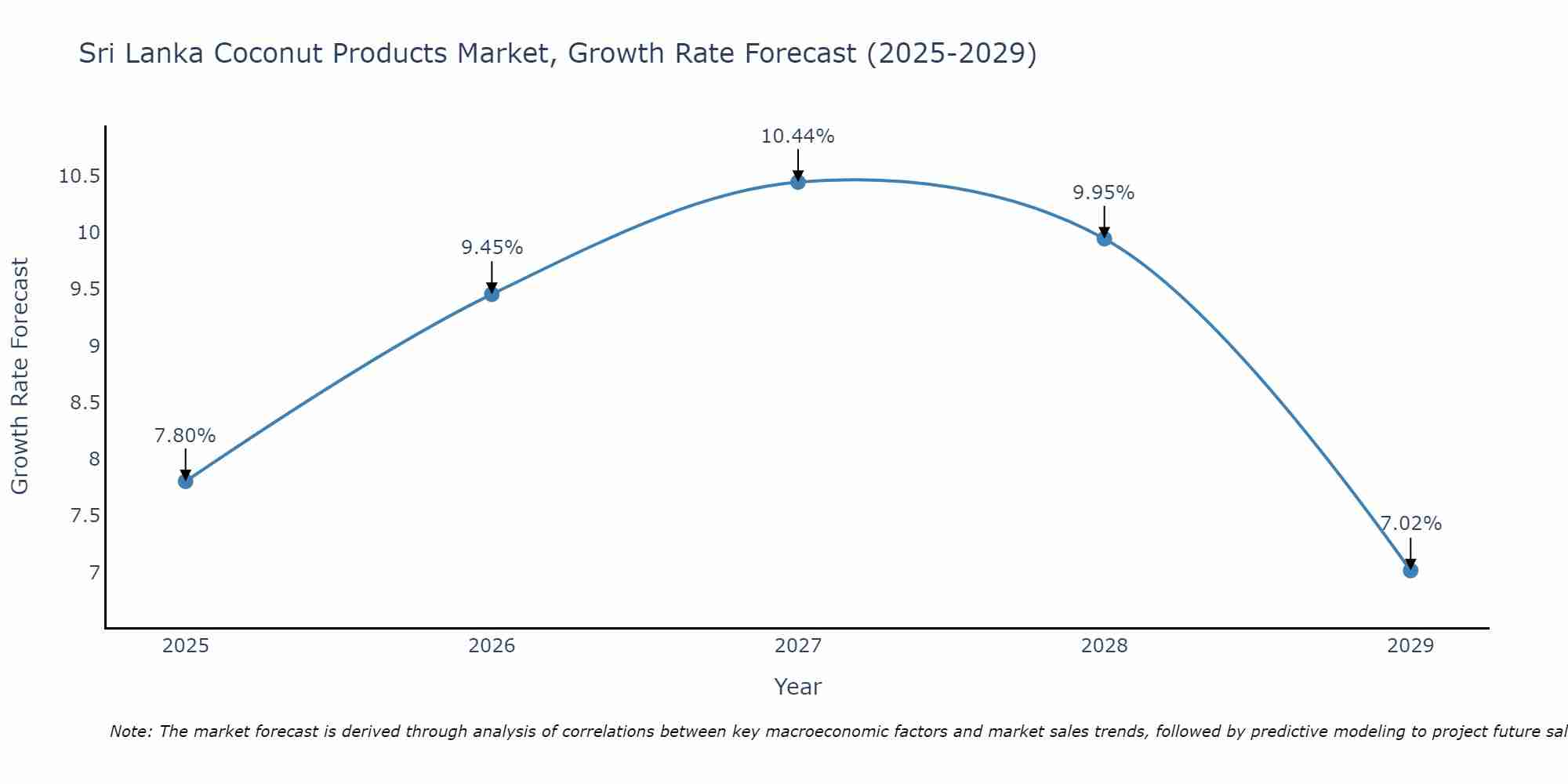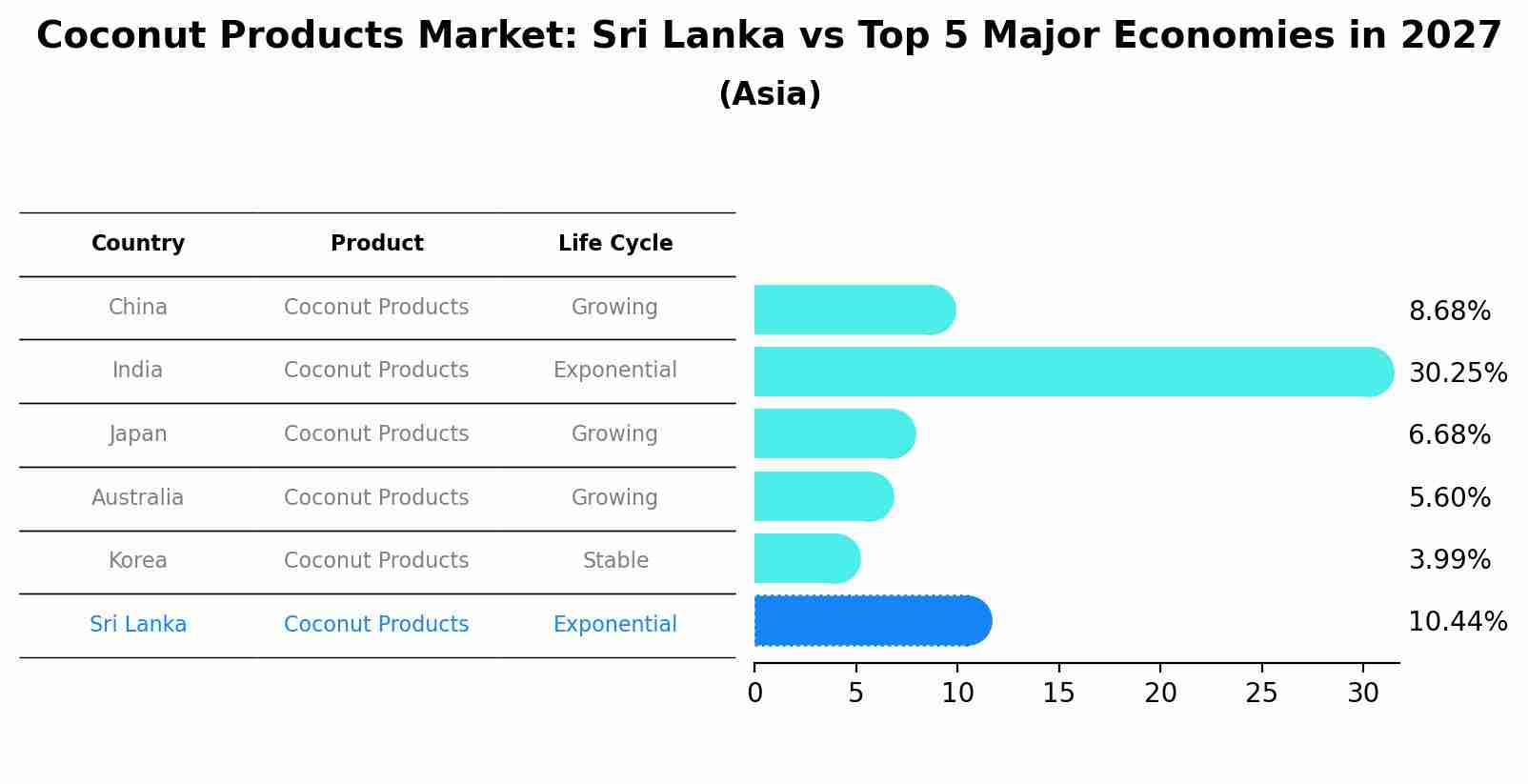Sri Lanka Coconut Products Market (2025-2031) Outlook | Share, Companies, Industry, Forecast, Size, Analysis, Growth, Revenue, Trends, Value
| Product Code: ETC410007 | Publication Date: Oct 2022 | Updated Date: Apr 2025 | Product Type: Market Research Report | |
| Publisher: 6Wresearch | Author: Ravi Bhandari | No. of Pages: 75 | No. of Figures: 35 | No. of Tables: 20 |
Sri Lanka Coconut Products Market Size Growth Rate
The Sri Lanka Coconut Products Market is projected to witness mixed growth rate patterns during 2025 to 2029. Starting at 7.80% in 2025, the market peaks at 10.44% in 2027, and settles at 7.02% by 2029.

Coconut Products Market: Sri Lanka vs Top 5 Major Economies in 2027 (Asia)
By 2027, the Coconut Products market in Sri Lanka is anticipated to reach a growth rate of 10.44%, as part of an increasingly competitive Asia region, where China remains at the forefront, supported by India, Japan, Australia and South Korea, driving innovations and market adoption across sectors.

Sri Lanka Coconut Products Market Overview
Sri Lanka is renowned for its coconut products, which include coconut oil, coconut milk, desiccated coconut, and coconut-based snacks. The market is robust due to Sri Lanka favorable climate for coconut cultivation and the traditional knowledge of coconut processing techniques. Export of coconut products contributes significantly to the country`s economy, with growing demand globally for organic and natural coconut-based products driving market expansion.
Drivers of the market
The Sri Lanka coconut products market is primarily driven by the country`s robust agricultural sector and the global demand for natural and organic products. The versatile use of coconut in various formssuch as coconut oil, desiccated coconut, coconut water, and coconut milkcaters to both local and international markets. Increasing health consciousness among consumers worldwide has elevated the demand for coconut-based products, perceived as healthier alternatives to synthetic and animal-based products. Additionally, government initiatives and investments in enhancing coconut cultivation techniques and processing facilities have significantly bolstered market growth. The export of value-added coconut products has also been a crucial driver, positioning Sri Lanka as a major player in the global coconut products market.
Challenges of the market
The Sri Lankan coconut products market faces challenges primarily related to fluctuating coconut production due to weather conditions and agricultural diseases. Additionally, maintaining quality standards for exports and ensuring sustainable farming practices are ongoing challenges. Competition from other coconut-producing countries also impacts market dynamics.
Government Policy of the market
The Sri Lankan government has implemented several policies to boost the coconut products market, recognizing the sector`s significant contribution to the economy. These policies include providing subsidies and financial support for coconut cultivation and processing, promoting organic and sustainable farming practices, and encouraging research and development for value-added products. Additionally, the government has established export incentives and marketing support to enhance the global competitiveness of Sri Lankan coconut products.
Key Highlights of the Report:
- Sri Lanka Coconut Products Market Outlook
- Market Size of Sri Lanka Coconut Products Market, 2024
- Forecast of Sri Lanka Coconut Products Market, 2031
- Historical Data and Forecast of Sri Lanka Coconut Products Revenues & Volume for the Period 2021-2031
- Sri Lanka Coconut Products Market Trend Evolution
- Sri Lanka Coconut Products Market Drivers and Challenges
- Sri Lanka Coconut Products Price Trends
- Sri Lanka Coconut Products Porter's Five Forces
- Sri Lanka Coconut Products Industry Life Cycle
- Historical Data and Forecast of Sri Lanka Coconut Products Market Revenues & Volume By Type for the Period 2021-2031
- Historical Data and Forecast of Sri Lanka Coconut Products Market Revenues & Volume By Coconut Water for the Period 2021-2031
- Historical Data and Forecast of Sri Lanka Coconut Products Market Revenues & Volume By Coconut Oil for the Period 2021-2031
- Historical Data and Forecast of Sri Lanka Coconut Products Market Revenues & Volume By Coconut Milk for the Period 2021-2031
- Historical Data and Forecast of Sri Lanka Coconut Products Market Revenues & Volume By Dried Coconut Products for the Period 2021-2031
- Historical Data and Forecast of Sri Lanka Coconut Products Market Revenues & Volume By Others for the Period 2021-2031
- Historical Data and Forecast of Sri Lanka Coconut Products Market Revenues & Volume By Application for the Period 2021-2031
- Historical Data and Forecast of Sri Lanka Coconut Products Market Revenues & Volume By Food for the Period 2021-2031
- Historical Data and Forecast of Sri Lanka Coconut Products Market Revenues & Volume By Beverage for the Period 2021-2031
- Historical Data and Forecast of Sri Lanka Coconut Products Market Revenues & Volume By Cosmetics for the Period 2021-2031
- Historical Data and Forecast of Sri Lanka Coconut Products Market Revenues & Volume By Others for the Period 2021-2031
- Historical Data and Forecast of Sri Lanka Coconut Products Market Revenues & Volume By Form for the Period 2021-2031
- Historical Data and Forecast of Sri Lanka Coconut Products Market Revenues & Volume By Solid for the Period 2021-2031
- Historical Data and Forecast of Sri Lanka Coconut Products Market Revenues & Volume By Liquid for the Period 2021-2031
- Sri Lanka Coconut Products Import Export Trade Statistics
- Market Opportunity Assessment By Type
- Market Opportunity Assessment By Application
- Market Opportunity Assessment By Form
- Sri Lanka Coconut Products Top Companies Market Share
- Sri Lanka Coconut Products Competitive Benchmarking By Technical and Operational Parameters
- Sri Lanka Coconut Products Company Profiles
- Sri Lanka Coconut Products Key Strategic Recommendations
Frequently Asked Questions About the Market Study (FAQs):
- Single User License$ 1,995
- Department License$ 2,400
- Site License$ 3,120
- Global License$ 3,795
Search
Thought Leadership and Analyst Meet
Our Clients
Related Reports
- Germany Breakfast Food Market (2026-2032) | Industry, Share, Growth, Size, Companies, Value, Analysis, Revenue, Trends, Forecast & Outlook
- Australia Briquette Market (2025-2031) | Growth, Size, Revenue, Forecast, Analysis, Trends, Value, Share, Industry & Companies
- Vietnam System Integrator Market (2025-2031) | Size, Companies, Analysis, Industry, Value, Forecast, Growth, Trends, Revenue & Share
- ASEAN and Thailand Brain Health Supplements Market (2025-2031) | Strategy, Consumer Insights, Analysis, Investment Trends, Opportunities, Growth, Size, Share, Industry, Revenue, Segments, Value, Segmentation, Supply, Forecast, Restraints, Outlook, Competition, Drivers, Trends, Demand, Pricing Analysis, Competitive, Strategic Insights, Companies, Challenges
- ASEAN Bearings Market (2025-2031) | Strategy, Consumer Insights, Analysis, Investment Trends, Opportunities, Growth, Size, Share, Industry, Revenue, Segments, Value, Segmentation, Supply, Forecast, Restraints, Outlook, Competition, Drivers, Trends, Demand, Pricing Analysis, Competitive, Strategic Insights, Companies, Challenges
- Europe Flooring Market (2025-2031) | Outlook, Share, Industry, Trends, Forecast, Companies, Revenue, Size, Analysis, Growth & Value
- Saudi Arabia Manlift Market (2025-2031) | Outlook, Size, Growth, Trends, Companies, Industry, Revenue, Value, Share, Forecast & Analysis
- Uganda Excavator, Crane, and Wheel Loaders Market (2025-2031) | Strategy, Consumer Insights, Analysis, Investment Trends, Opportunities, Growth, Size, Share, Industry, Revenue, Segments, Value, Segmentation, Supply, Forecast, Restraints, Outlook, Competition, Drivers, Trends, Demand, Pricing Analysis, Competitive, Strategic Insights, Companies, Challenges
- Rwanda Excavator, Crane, and Wheel Loaders Market (2025-2031) | Strategy, Consumer Insights, Analysis, Investment Trends, Opportunities, Growth, Size, Share, Industry, Revenue, Segments, Value, Segmentation, Supply, Forecast, Restraints, Outlook, Competition, Drivers, Trends, Demand, Pricing Analysis, Competitive, Strategic Insights, Companies, Challenges
- Kenya Excavator, Crane, and Wheel Loaders Market (2025-2031) | Strategy, Consumer Insights, Analysis, Investment Trends, Opportunities, Growth, Size, Share, Industry, Revenue, Segments, Value, Segmentation, Supply, Forecast, Restraints, Outlook, Competition, Drivers, Trends, Demand, Pricing Analysis, Competitive, Strategic Insights, Companies, Challenges
Industry Events and Analyst Meet
Whitepaper
- Middle East & Africa Commercial Security Market Click here to view more.
- Middle East & Africa Fire Safety Systems & Equipment Market Click here to view more.
- GCC Drone Market Click here to view more.
- Middle East Lighting Fixture Market Click here to view more.
- GCC Physical & Perimeter Security Market Click here to view more.
6WResearch In News
- Doha a strategic location for EV manufacturing hub: IPA Qatar
- Demand for luxury TVs surging in the GCC, says Samsung
- Empowering Growth: The Thriving Journey of Bangladesh’s Cable Industry
- Demand for luxury TVs surging in the GCC, says Samsung
- Video call with a traditional healer? Once unthinkable, it’s now common in South Africa
- Intelligent Buildings To Smooth GCC’s Path To Net Zero


















